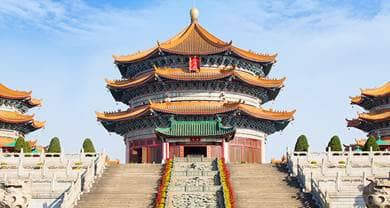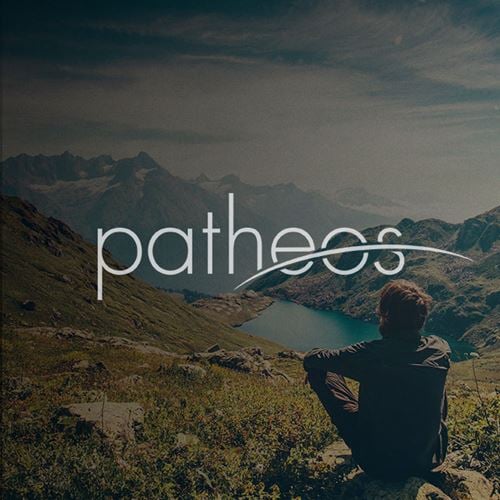- Trending:
- Forgiveness
- |
- Resurrection
- |
- Joy
- |
- Feminism
- |
- Afterlife

RELIGION LIBRARY
Taoism
Vision for Society
The Taode jing proposed a utopian vision of society based on the notion of a wise and noble ruler whose strength of moral character (de) inspired moral behavior throughout the country. Additionally, one of the final chapters of the Taode jing (Ch. 80) described the ideal country as one which was small, with a small population that avoided technological advances in preference for simple living, and was self-contained, uninterested in other small countries nearby. The Confucian Zhouli, Rites of the (State of) Zhou, also described a utopian society, in this case one that would be brought about by strict organization and regulation.
Unlike the rebellious Yellow Turbans who were their contemporaries, the Way of the Celestial Masters did not advocate overthrowing the current government, but both shared a utopian view of what society should be. According to the Celestial Masters texts, there should above all be peace and harmonious living among the people, and the ruler should also be a religious leader. The texts stated that the ruler should follow the moral model presented in the Taode jing, but the means of regulating the state as an elaborate bureaucracy were closer to those of the Zhouli.
Throughout its history, Taoism has retained a utopian vision of an ordered and harmonious society, although the means of achieving this have varied. One constant component has been an emphasis on individual self-cultivation as a means of maintaining social harmony. For the individual, one's relationship with nature begins at home, not only within one's immediate surroundings, but within one's own body.
Western advocates of environmentalism have often cited Taoist principles. These principles advocate following the lead of nature rather than trying to control it, and maintain that humans are natural creatures who should live in harmony with nature. The idea of balance between opposites and the interdependence of all things, an ancient equivalent of today's notion of the ecosystem, suggests that excessive movements toward urban development will inevitably result in an imbalance that nature will, of necessity, correct in the form of "natural disasters." The Taoist idea of transcendence is not one of an escape from nature, or of dominance by humans or gods over nature, but of the return to nature, of the constant recreation of life as manifested in nature's creative process.
In contrast to these principles, within China itself environmental concerns have often been neglected, most recently in favor of catching up with the western world and obtaining a characteristically modern western way of life for its citizens. To counter this, many Taoist temples and monasteries in China today have become actively engaged with the environmentalist movement. For example, many have joined the Alliance of Religions and Conservation, and the United Nations, who together hope to create a "heaven on earth" based on an ecological model. A series of Ecology Forums has been held in China, attended by many Taoist representatives, and these conferences have yielded an eight-year plan for environmental change. The plan, begun formally in 2010, includes instituting eco-friendly temple practices, creating camps to expose youth to natural environments, and incorporating concerns for the environment into traditional cosmic dances. The ancient Mao Shan temple, home of the Shangqing sect, has issued a declaration advocating better use of natural resources and simpler lifestyles, creating environmental protection programs, using energy-saving technology and materials, and educating the public through the media and special programs.
Many of these actions have already been initiated. New temples are being built according to sound ecologically-based models. By late 2008, solar panels had been installed in half the Taoist temples in China, with plans to do so in all temples as quickly as possible. Pilot projects for all of the goals outlined above are underway. Whether Taoism, a religion so recently persecuted to the point of virtual destruction, will be able to influence China's burgeoning desire for automobiles and modern conveniences remains to be seen, but the proponents of this effort say that they are accustomed to adversity and optimistic about the possibilities.
Westerners are also pursuing the potential of Taoist thought within the modern environmentalist movement. A Taoism and Ecology conference was held at the Center for the Study of World Religions at Harvard University in 1998, and a volume of papers from this conference was published the following year as Daoism and Ecology: Ways within a Cosmic Landscape. These papers address the contrast between Taoist ideals and Chinese realities, and also criticize the superficial interpretations of Taoism that are often propounded by environmental advocates in the west, but this even-handed volume also offers an intelligent and informed presentation of the ways in which Taoism can support the world environmentalist movement in the 21st century.
Study Questions:
1. How can an individual in an urban area experience a “return to nature”?
2. How is the Taoist concept of self-cultivation applicable to Western environmentalism?
3. How is this ancient concept (of self-cultivation) restructuring itself to stay relevant in the 21st century?










